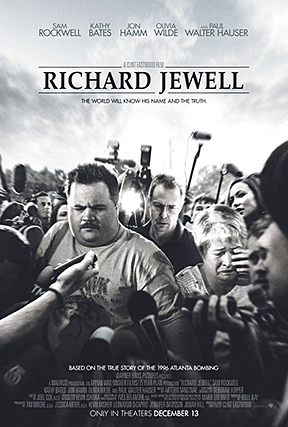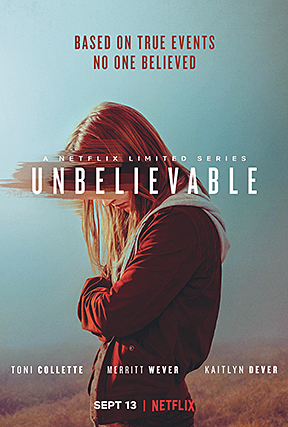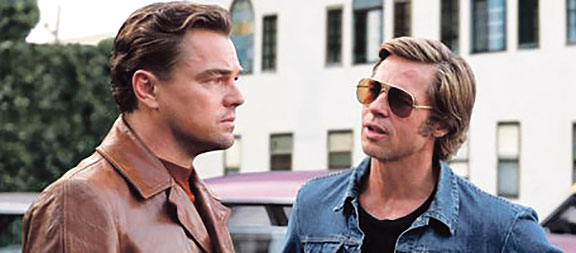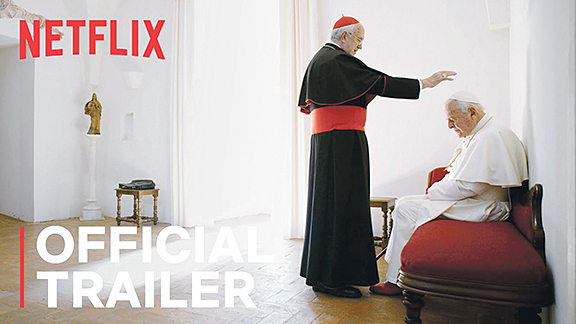Yesterday on Film Today
The December 21 Post-Standard published commentary by Atlanta Journal-Constitution editor in chief Kevin Riley, in which Riley points out misrepresentations in
 Clint Eastwood’s based-on-a-true-story film, Richard Jewell. Richard Jewell is the security guard who, for a brief but traumatic time for him, was both a hero and suspect in the 1996 bombing at the Atlanta Olympics. Mr. Riley describes how Eastwood utilized fake and real names and events to blame the media for the FBI’s initial suspicion of Jewell.
Clint Eastwood’s based-on-a-true-story film, Richard Jewell. Richard Jewell is the security guard who, for a brief but traumatic time for him, was both a hero and suspect in the 1996 bombing at the Atlanta Olympics. Mr. Riley describes how Eastwood utilized fake and real names and events to blame the media for the FBI’s initial suspicion of Jewell.
Like most historical fiction, based-on-real-events films generally reflect some sympathetic perspective. Netflix’s When They See Us tells the stories of the Central Park Five teens who confessed to savaging a jogger in 1989. The jogger, Trisha Meili, suffered brain injuries resulting in her inability to identify the assailants. Trisha Meili later described her experience and recovery in a 2003 memoir published after Matias Reyes confessed in 2001 to attacking Trisha on his own.
Sometimes, facts, multiple perspectives and understanding of past events fit like pieces of a puzzle assembled over time.
 Netflix’s Unbelievable is based on the 2015 ProPublica/Marshall Project report about an 18-year-old rape victim, Marie. Investigators asked Marie to consider the possibility that she might have imagined the attack. Marie complies and having considered that possibility, finds the investigators doubt her recollections even more. Eventually Marie recants, pleads guilty to making a false report, and finds herself on probation and vilified. Meanwhile, investigators in Colorado and Washington State have been sharing resources to apprehend a serial rapist who’s always careful not to leave DNA evidence behind. Their investigation leads them to Marie. The Netflix film sticks close to the non-fiction narrative of the case. Netflix, the Pro-Publica report and NPR interviews reveal that Marie’s previous foster mothers, both rape victims, didn’t believe Marie because their experiences differed from hers. Unbelievable shows the slow and methodical work involved in criminal investigations.
Netflix’s Unbelievable is based on the 2015 ProPublica/Marshall Project report about an 18-year-old rape victim, Marie. Investigators asked Marie to consider the possibility that she might have imagined the attack. Marie complies and having considered that possibility, finds the investigators doubt her recollections even more. Eventually Marie recants, pleads guilty to making a false report, and finds herself on probation and vilified. Meanwhile, investigators in Colorado and Washington State have been sharing resources to apprehend a serial rapist who’s always careful not to leave DNA evidence behind. Their investigation leads them to Marie. The Netflix film sticks close to the non-fiction narrative of the case. Netflix, the Pro-Publica report and NPR interviews reveal that Marie’s previous foster mothers, both rape victims, didn’t believe Marie because their experiences differed from hers. Unbelievable shows the slow and methodical work involved in criminal investigations.
Fact is often less entertaining than fiction. I know many people who wish that America was like it used to be in Andy Griffith’s 1960-1968 fictional Mayberry. Another show, Get Smart (1965-1970) presents a differing fiction: that of CONTROL spy Maxwell Smart in his bumbling fight against the Soviet bloc ‘s KAOS. I remembered Get Smart while reading Tom O’Neill’s and Dan Piepenbring’s Chaos: Charles Manson, the CIA, and the Secret History of the Sixties. O’Neill reveals Chaos was a CIA operation designed to infiltrate the 1960’s, radical groups. O’Neill seeks to replace the Helter Skelter explanation of Manson’s crimes with a scarier, plausible confluence of sex, drugs, drug informants and LSD mind-control research. In his film, Once Upon a Time in Hollywood Quentin Tarantino presents a comic book ending to Manson’s crimes, leaving viewers with a fairy tale ending to Sharon Tate’s horrifying demise. Most audiences don’t want to watch suffering. Concluding tragedies with explosive comic book victories probably satisfies better than sad expositions of victim helplessness. So, why not just create fake characters in fake stories?
I liked Once Upon a Time in Hollywood. I like real historical analysis more.
My history includes hearing a labor policy professor state that International Brotherhood of Teamsters President Jimmy Hoffa was a great man who would deal with the devil if it benefited his union, and, that if Hoffa had lived, Congress would never have passed the 1980 “Motor Carrier Act” deregulating interstate trucking.
Hoffa disappeared.
The based-on-real-events narrative provided in Martin Scorcese’s 2019 The Irishman, based on Charles Brandt’s book I Heard You Paint Houses: Frank “The Irishman” Sheeran and Closing the Case on Jimmy Hoffa, rings true to me. Scorcese’s film slowly and painstakingly builds a contextual narrative which could very well describe how Jimmy Hoffa’s life ended and how “the Irishman” Frank Sheeran found himself enlisted in the end, to achieve that end. Robert De Niro thoughtfully portrays Frank Sheeran as a man caught up in working for two masters. Toward the film’s conclusion, Joe Pesci’s portrayal of Russell Bufalino on his way to a prison chapel is perfect.
 Roman Catholicism looms large in the background of many of Scorcese’s movies and, The Irishman is not the only 2019 Netflix film that suggests, based-on-real-events, that some important figure has made some confession or admission.
Roman Catholicism looms large in the background of many of Scorcese’s movies and, The Irishman is not the only 2019 Netflix film that suggests, based-on-real-events, that some important figure has made some confession or admission.
The Two Popes depicts a multi-day excruciating get-to-know-you visit/probative interrogation directed by Pope Benedict XVI toward his perceived ideological enemy Cardinal Jorge Mario Bergoglio, the current Pope Francis. Once Benedict concludes that he’s gotten what he seeks, Benedict asks Bergoglio to hear his confession.
The Two Popes and The Irishman’s confessional endings ring true.
Are they true?
Somebody somewhere knows, or did know.
Happy 2020.










